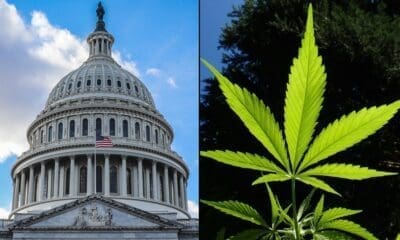Politics
Vermont Governor Seems Open To Legalizing Marijuana Sales

Vermont’s governor is apparently open to legalizing, taxing and regulating marijuana sales in the state—a significant shift from his earlier position.
While the legislature legalized low-level possession and home cultivation in 2018, the current law doesn’t allow for sales, and Gov. Phil Scott (R) has said in the past that he’s wary about allowing such commercial cannabis activity, citing concerns about impaired driving.
But the 2020 session could be different, as Scott is reportedly eyeing tax-and-regulate legislation and considers it a potential source of revenue to support an after-school program he’s pushing. The governor still wants to ensure any reform legislation includes provisions to prevent driving under the influence.
“If we do end up there, this might be a good use of any revenues from there,” Administration Secretary Susan Young told Vermont Public Radio in an interview released on Wednesday. “That’s not exclusively how we plan to fund it, but we’re going to have to be creative and looking like we did with clean water to find a source.”
Listen to Young’s comments in the audio clip below:
Another state official, Cynthia Seivwright, director of the state Department of Health’s Alcohol and Drug Abuse Programs, said in a radio interview last month that legalizing marijuana sales would better protect public health than current policy does.
“Without the regulation, we don’t know what’s in it,” she said. “We can’t control the potency of it. We can’t control the access, and we definitely don’t want children and adolescents to have access to it.”
According to top lawmakers in the state, the legislature is positioned to advance a cannabis commerce bill, with most members in favor of the reform move.
House Speaker Mitzi Johnson (D) said last month that she believes “there is a solid tri-partisan majority in the House that would like to see tax and regulate pass this year.” While she has expressed reluctance about the legislation in the past, the speaker now says she won’t block her chamber from passing it.
Last week, Senate Judiciary Committee Chairman Richard Sears (D) and House Government Operations Committee Chairwoman Sarah Copeland-Hanzas (D) said in a press conference that the time is right to act on marijuana legalization.
“We are shipping tax dollars out of state and fueling the economy in those states in this industry in another state,” Sears said. “It makes no sense whatsoever.”
“We look forward to working with our House counterparts in a conference committee to arrive at a bill that is supported by most members of the legislature, the governor and the general public,” he added.
Copeland-Hanzas said adults in Vermont “need to have safe and legal access to cannabis.”
“This is an opportunity—and a very unique opportunity—to stand up a new industry and to create jobs and to fill some of our vacant manufacturing and warehouse facilities in Vermont,” she said.
Matt Simon, New England political director of the Marijuana Policy Project, agreed.
“It seems clear to me in the year 2020 there is no state in the U.S. that is more ready to regulate cannabis sales than Vermont,” he said.
Other political observers in the state seem to think that Scott is coming around to legalizing sales despite his earlier reluctance.
“The governor already seems to be counting those chickens that are going to be hatched from whatever tax-and-regulate system we have as it relates to revenue that’s going to be generated by a retail marijuana market,” Pete Hirschfeld of Vermont Public Radio said in a recent TV appearance. “If we read the tea leaves we can see that Governor Phil Scott has essentially resigned himself that this is an eventuality and is counting on using legal marijuana tax dollars to fund his priorities.”
Watch Hirschfeld’s comments, about 17:10 into the video below:
While it remains to be seen whether the governor will ultimately back a tax-and-regulate bill, such as legislation that was approved by the Senate last year—a proposal discussed again by the body’s Judiciary Committee on Wednesday—advocates are optimistic this legislative session will be a success.
The Senate-passed bill, which is still alive for 2020, has already been approved by one House committee. At the press conference last week, Sears expressed some frustration about how long it is taking for House committees and leadership to deal with legislation, saying he wants to get finalized legislation through a bicameral conference committee and to the governor’s desk by early March.
Scott could feel additional pressure to support a commercial marijuana model given that he’s facing a reelection challenge this year from Lt. Gov. David Zuckerman (Vermont Progressive Party), who is strongly in favor of taxing and regulating the state’s cannabis market.
It’s official: I’m running for Governor. For the past 25 years, I've worked with you to make our state better. Now, I'm asking for your support. Let's go.#vtpoli #vt #ZuckermanforVT pic.twitter.com/l6VfUJZGiG
— David Zuckerman (@zuckermanforvt) January 13, 2020
“I think every year we go by not doing it, we are perpetuating the underground, unregulated, unjust system that we have today while other states are moving forward,” Zuckerman said in 2018.
Over in neighboring New Hampshire, lawmakers have decided to take a lesson from Vermont and pursue non-commercial cannabis legalization this session—a move that was described to Marijuana Moment as an incremental, albeit important, step toward eventual commercialization.
Montana Activists Submit Measure To Legalize Marijuana In 2020
Photo courtesy of WeedPornDaily.
















